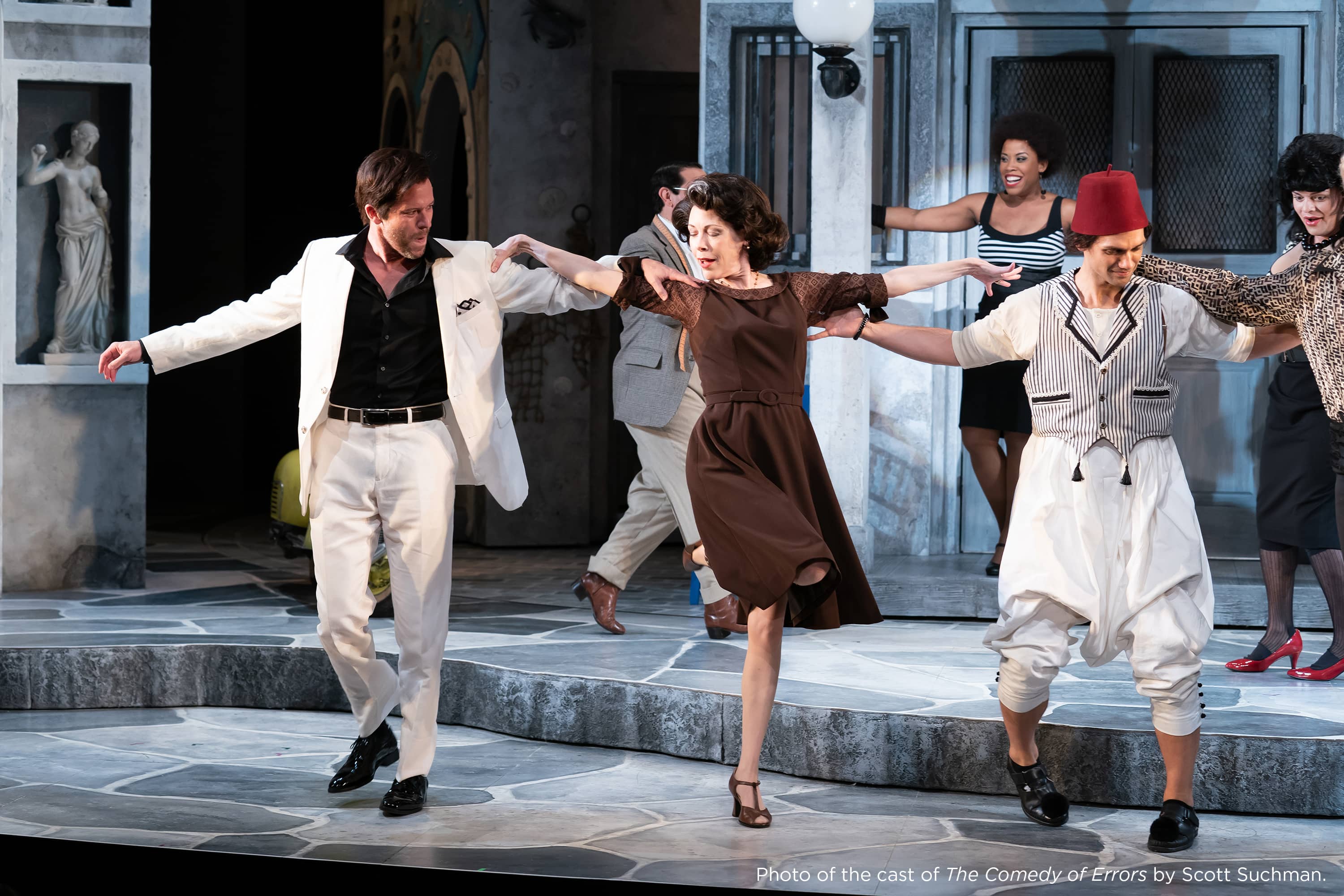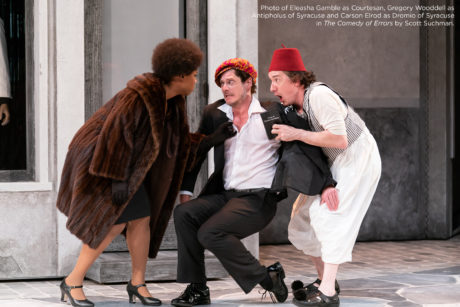The Comedy of Errors is one of Shakespeare’s earliest and most popular works, so there is little point recounting the plot. One must only remember that it is the one with two sets of twins: one a pair of masters, the other a pair of servants, separated in infancy by a shipwreck (rather than the one in which one pair of twins is separated by a shipwreck in adulthood).
Because the Bard adapted it from Plautus’ Menaechmi, the play is also something of an oddity in the Shakespeare canon in that it is both one of only two works that adhere to the Aristotelian unities of time, place, and action while also being the most tightly structured of all his plays. Nowhere else is Shakespeare so meticulous about pairing causes with effects.

The Shakespeare Theatre Company production, directed by Alan Paul, is set in the Greek coastal city of Ephesus in the 1960s. Today, Ephesus is in Turkey and primarily an archaeological site; its residents were driven out centuries ago, long before Shakespeare’s era. But this is a farcical Mediterranean that ignores such political realities (expect to hear the exclamation “opa!” early and often), and instead uses Shakespeare’s original as a basis for musical theater incorporating original songs by Michael Dansicker. DCMTA’s David Siegel interviews Dansicker here.
The set, by Scenic Designer James Noone, is an elaborate construction. The city’s buildings (set aglow by Lighting Designer Mary Ellen Stebbins) revolve around back alleys on a giant turntable, while the shops, the fishmonger’s restaurant, the abbey, the police station, the courtesan-frequented inn, and most importantly, the home, rotate on their own smaller turntables. Wheels within wheels (much like the plot) create an ever-shifting cityscape as the characters move from scene to scene climaxing in the uproarious chase of the final act. But the comedy is also in the details: classical sculpture is used advertise sensual pleasures rather than aesthetic inspiration, and kitschy commercial displays, whether seafood or gold, emphasize that the city is a place where appetites are fed.
Veanne Cox plays Adriana with a range of comic registers. She parodies the melodramatic upper-class wife of early-’60s pop culture scorned by her carousing husband the Antipholus of Ephesus (Christian Conn), escalating to a great moment of physical comedy when she expresses her rage by sliding across the floor in unexpected directions, while also enjoying a lustful tryst with the Antipholus of Syracuse (Gregory Wooddell). In another scene, when every error is revealed, her knowing reaction hits like a perfectly timed punchline. Yet throughout, she is a past era’s interpretation of what it means to be a modern woman who demands respect in her relationships. Meanwhile, Folami Williams plays Luciana as a more traditional inamorata, in love with the idea of love until it finds her.
Carson Elrod and Carter Gill are ever entertaining as the Dromios of Syracuse and Ephesus, with Elrod giving a perfectly phrased delivery of the allegory of Luce to the globe and Gill on the receiving end of abuse when locked out of his master’s house. Tom Story is a flamboyant and fabulous goldsmith. Sarah Marshall, as Dr. Pinch, gives an eccentric performance to the exorcist as a charismatic preacher. Ted van Griethuysen (Egeon), Nancy Robinette (Emilia), and J. Bernard Calloway (Duke Solinus) bring the gravitas that grounds the comedy in the possibility of tragedy.
Comedy Fight Choreographer David Leong crafts some wonderful slapstick in which the implements include not just swords and sticks but fish, octopods, ropes, crucifixes, and drinking glasses. Beatings, bitings, and jabs – even the opening and shutting of windows, doors, and mail slots – are timed to iambic pentameter.
Dance Choreographer Karma Camp draws on a number of styles recognizable from musicals and their film adaptations – from the folk-inspired steps of the rebetiko-influenced opener (Matt Bauman performs a crowd-pleasing solo incorporating pirouettes) to the tap dance number featuring the local constabulary, to the bawdy Bob Fosse homage performed by Eleasha Gamble in the nightclub scene at the Porcupine (the name has been modernized from the original “Porpentine”).

Costume Designer Gabriel Berry dresses the cast in a range of fashionable, officious, foppish, and archetypical threads. The Dromios and the male servants wear traditional fezzes and pleated fustanellas, the Abbess Emelia embroidered robes. The flamboyant goldsmith is outfitted like a lounge lizard, his gold threaded shirt suggestively unbuttoned to advertise his wares. Meanwhile the Antipholi, the Duke, and Dr. Pinch sport well-tailored suits and the Ephesian sisters are glamorous in their high fashion dresses and skirt and blouse combinations. Most exquisite is the quilled headdress worn by Gamble’s courtesan during her cabaret act as the Porcupine’s featured entertainment.
The topical and local references are slight: Melania’s name is dropped, the marijuana jokes aren’t so daring now that it’s legalized in the District, and the Dr. Pinch scene allows for references to The Exorcist (parts of which were famously filmed in Georgetown).
It may or may not be a coincidence that Shakespeare set the action in Ephesus, the birthplace of Heraclitus, the ancient philosopher who most questioned our notions of identity, in a play in which two sets of characters are forced to question their own and that of everyone they meet. In this production, Paul has the “proteans” (Bauman, John Cardenas, and Justin G. Nelson) rapidly transforming from cops to sex workers to fishmongers to messengers to nuns – even they feign confusion at times. Yet while the city is playfully in flux for five acts, the peace of Ephesus and the family of Egeon is restored, all debts are settled, and all indignities are forgiven. Paul explores the themes for the sake of entertainment, not for subversion (for all the beatings the Dromios receive at the hands of their masters, they never question the class structure). Entertainment is what STC’s audience wants and this Comedy of Errors delivers with virtuosity.
Running Time: 100 minutes, with no intermission.
The Comedy of Errors plays through November 4 at the Shakespeare Theatre Company, performing at the Lansburgh Theater – 450 7th Street, NW, in Washington, DC. For tickets, call (202) 547-1122 or go online.





Villa Nicoletta is part of some of the most beautiful St Thomas Villas on this isle.
These initiatives could be at work, dwelling, or place of work.
Don’t worry if you’re confused, you’re not alone.